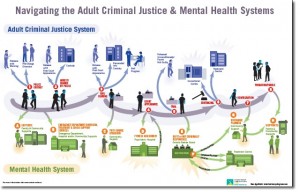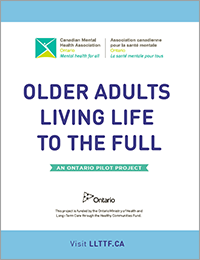The Waypoint Research Institute hosted its third Annual Knowledge Translation in Mental Health and Addictions Conference this week, and CMHA Ontario shared two presentations at the conference.  The first presentation was on the topic of Navigating the Adult Criminal Justice and Mental Health Systems. Delivered by Policy Analyst Dorina Simeonov, the presentation provided an overview of how the adult mental health and criminal justice map was created, what it looks like and how it can be used. The map outlines the various pathways through the criminal justice system with a focus on where it intersects with the mental health system. Each individual’s journey can be different and not all journeys through these systems are reflected in this map. The map has been used as a knowledge exchange tool to educate and develop a common understanding among service providers who work at the intersection of the two systems. The youth version of the map, developed by the Centre for Addiction and Mental Health, has also been used by the Justice Service Collaboratives to inform system mapping, gap analysis, planning and implementation of local interventions.
The first presentation was on the topic of Navigating the Adult Criminal Justice and Mental Health Systems. Delivered by Policy Analyst Dorina Simeonov, the presentation provided an overview of how the adult mental health and criminal justice map was created, what it looks like and how it can be used. The map outlines the various pathways through the criminal justice system with a focus on where it intersects with the mental health system. Each individual’s journey can be different and not all journeys through these systems are reflected in this map. The map has been used as a knowledge exchange tool to educate and develop a common understanding among service providers who work at the intersection of the two systems. The youth version of the map, developed by the Centre for Addiction and Mental Health, has also been used by the Justice Service Collaboratives to inform system mapping, gap analysis, planning and implementation of local interventions.
The presentation included a glimpse of the interactive way the map can be adapted using Prezi to serve as an educational tool for those working at the intersection of the two systems, as well as individuals with mental health and addictions issues who have come into contact with the law and their families. A copy of the map is also available online.
 The second presentation, given by Scott Mitchell, Director of Knowledge Transfer at CMHA Ontario, presented findings from an exciting pilot project aimed at enhancing mental well-being among older adults in Ontario. Between April and October 2014, CMHA branches across the province worked in partnership with older adult community centres to deliver and evaluate Living Life to the Full, an eight-week (12-hour), evidence-based mental health promotion course. Taught by trained facilitators in a group setting, the course is designed to help people deal with everyday life challenges using cognitive behaviour therapy concepts and techniques.
The second presentation, given by Scott Mitchell, Director of Knowledge Transfer at CMHA Ontario, presented findings from an exciting pilot project aimed at enhancing mental well-being among older adults in Ontario. Between April and October 2014, CMHA branches across the province worked in partnership with older adult community centres to deliver and evaluate Living Life to the Full, an eight-week (12-hour), evidence-based mental health promotion course. Taught by trained facilitators in a group setting, the course is designed to help people deal with everyday life challenges using cognitive behaviour therapy concepts and techniques.
The pilot included a formal research project, conducted in collaboration with Rotman Research Institute at Baycrest and York Institute for Health Research at York University. The study demonstrated that older adult participants in Living Life to the Full experienced significant improvements in mood, anxiety, stress levels, social connectedness and overall quality of life. The presentation also included reflections on how to implement an evidence-based program while simultaneously engaging in new research to support future implementation. For more information, visit the Living Life to the Full project webpage.